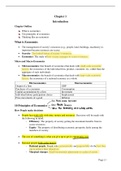Class notes
Study Notes for 1st year Intro to Macroeconomics course
- Institution
- Saint Mary’s University (StMU )
These notes include detailed summaries of key concepts covered in the "Mankiw, N. Gregory, Ronald Kneebone, and Kenneth McKenzie, Principles of Macroeconomics, 7th Canadian Edition." textbook. I used these notes to gain an A+ for this course.
[Show more]



